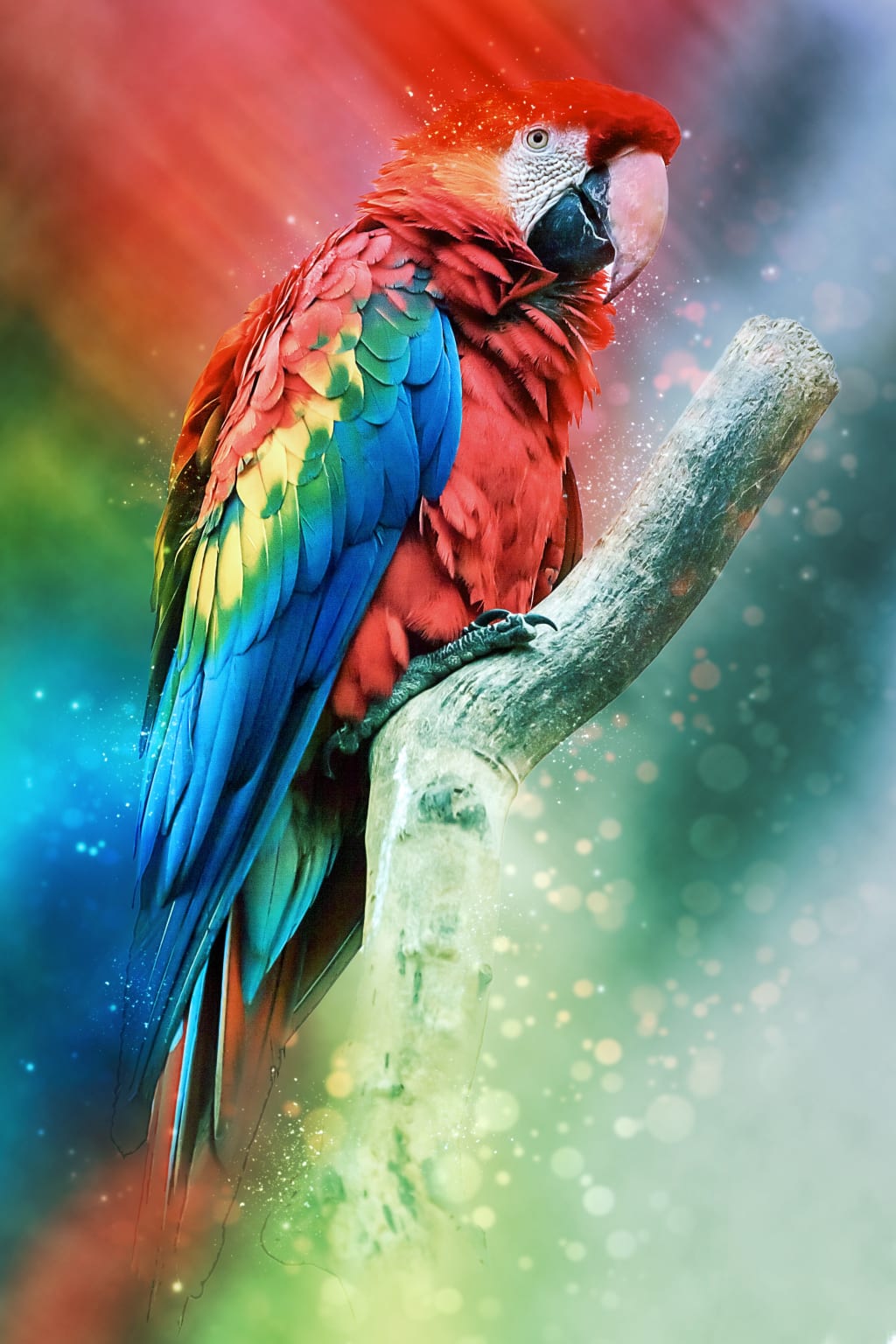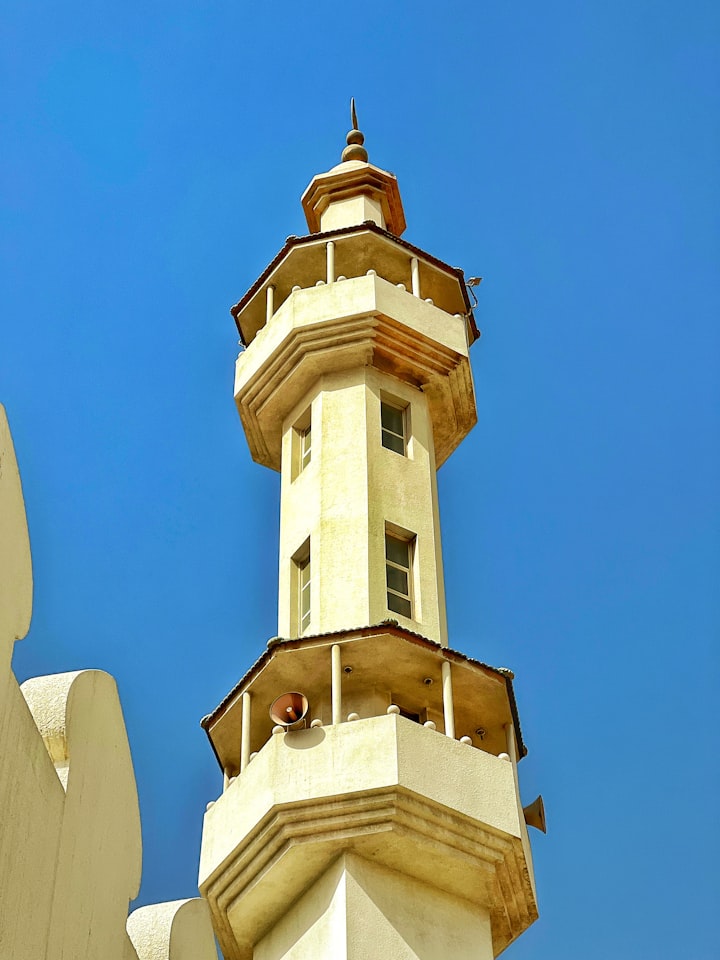A Tale of Two Fledglings
The Fate of the Scarlet Macaw Is Grim, Due to Deforestation and the Black Market

I grace each tree with a flash of color as I soar through the forest. Lowering my tail, I use my wings to oppose the current, slowing down, grasping a branch with my feet. The rest of my flock arrive, and we settle down after a morning of foraging by the river bank.
Inside the hole in the tree, my mate keeps our two eggs warm in our nest. It is our first clutch of eggs together upon our first mating. I share the food from my crop that I’ve foraged. My mate is hungry.
The sun is now high in the sky, and we settle down to rest. Far away I hear buzzing sounds, which make it difficult to rest. At times I hear a crashing sound in the distance. I feel uneasy. Half my brain goes into a deep sleep, whereas the other hemisphere stays completely alert, as I keep watch, one eye open.
The following day, one of our eggs starts quivering as it cracks, and a tiny squeaking voice can be heard. Out comes a pinkish-purplish little blob of baby bird with just a tiny bit of stringy fluff on it. It struggles, moving its wings and feet to try to maneuver out of the shell.
Just then we hear another peeping sound and the other egg starts quivering as a small crack forms. Our second baby hatches and it tries to extract itself from its shell comically. Once they are free from their shells, both of them make tiny squawks during their first feedings.
As the days go by, the fluff on their backs becomes more prominent, and their wings flap in time with their squawks. Feeding time is an exciting time, as seen by their rapidly flapping little wings and wriggling bodies. They are active little things, always hungry and messing up the nest, and when their bursts of energy are spent, they quickly fall asleep. Being first-time parents is an active task, especially for my mate, who does most of the caregiving, while I’m off foraging.
The buzzing and crashing become louder over time. The noise comes from the direction of the forest line, which keeps receding. Flying close to that area to investigate recently shows that trees have been disappearing because of the ‘tree cruncher’.
I watch as our chicks grow from naked little lumps displaying prominent open mouths. When they are a couple weeks old, their eyes are noticeably open. They are moving around the nest, exploring, and curious to know what the circle of light is that I keep passing through when I bring their mother food to distribute to them from her crop. Although it will be a long time until they are ready to leave the nest, they are growing each day.
We watch them as they grow into little macaws covered in fluff. Little fluff-balls, starting to show their coloring and patterns, with very different personalities. My son is much more outgoing and ready to take risks, whereas my baby girl is shy, docile like her mother. Finally, their bright feathers start sprouting beautifully.
As the days get longer, and the buzzing louder, my wings start quivering, due to the nearing of the tree cruncher. My stress level increases, and I find my mate is agitated, too. We need to leave, as we feel it’s no longer safe, but we won’t abandon our little ones.
We know the tree cruncher is close by, as the buzzing and thumping have become very loud. Suddenly, I hear some of our flock, cawing, scattering to the wind. A crashing sound ends with a thump, vibrating from the ground up through our tree trunk. The buzzing then becomes unbelievably loud, and I can feel the vibrations from the source of the noise. We can’t leave the nest unprotected! My crest is down and tail fanned out as I crouch and hiss towards the tree opening. I know it’s the tree cruncher that’s causing the vibrations.
The noise becomes even louder and our tree starts shaking. I start to panic. What should we do? My mate and I have no choice but to encourage our children to leave the nest prematurely. We nudge them onto the branch outside, in a scramble. My mate and I launch ourselves from the branch. We see others of our flock who had stayed behind to guard their nests launch off away from the commotion.
My mate and I stop, not far from our home. One of our little fledglings is trying to fly to us, but his feathers are still underdeveloped, so he flies poorly, and ends up on the ground. The other is trying to hop from one branch to another outside the nest. She is too scared to try to fly at all. We look back in horror as we watch the tree with our nest roughly plummet to the ground.
We find our fledgling who flew to the ground, and he is safe. I leave my mate with him as I urgently fly to our tree, squawking to try to scare the tree cruncher away so I can look for our other little fledgling. One of the giant buzzers stops.
“Catch it!” I hear someone exclaim. “That thing’s worth a fortune!”
Although I don’t understand the words, I know what a giant predator chasing me looks like, and I speedily fly up to the next tree. I will have to come back down later. I feel frantic about my chick, and my body reflects that agitation, but I need to be cautious.
I hear the predators communicating with each other. They are searching the ground. I keep a firm watch on them.
“Must be a nest around here. Did you see the way that one came at us? Let’s try to lure it. Careful where you step.”
I hear a strange whistling sound come from one of them.
“Look what I found! Jackpot!” Underneath broken foliage, I see movement. The bright colors of my fledgling peek through, and I hear her little, fearful squawks. She’s alive. I'm relieved for a second, then I panic.
Get away from her! I desperately and angrily fly down to where they have her cornered, my helpless baby girl. I can see her trembling in terror. I fly down, attacking the predators with my powerful beak.
“What the hell? Get it off me!” I relentlessly attack, until something bulky is thrown over me. It’s thicker than the usual foliage and I can see through it. I hear my baby’s cries and start tearing at the strange material.
“Damn! Does anyone have anything thicker? He ripped right through my shirt!”
I hear them scrambling. I must scare them away! My daughter is too small to fly, and she’s paralyzed by fear. Scaring away predators of this size though—they’re huge.
“Let’s just take the little one and go. It will be easier to manage than the big one. That one has a fury like a demon from hell.”
“Great way to end this stage of the job. Drinks are on me tonight!”
I watch as they cover my baby in some material and start moving away. I’m torn between trying to free her and getting back to protect my mate and son. I follow my daughter’s captors for some time from a distance, then see them climb on some strange contraption. I hear a loud roaring, then I’m inhaling terrible fumes that burn. They speed off, beyond any speed that I could possibly match.
After a few minutes of trying to follow them, I realize it’s hopeless. They are gone, and so is my baby girl. I spill from my flight, unable to handle the burning fumes and the sorrow any longer. I walk haphazardly, somewhat disoriented, and manage to flutter aside. Once I gain my wits about me, I realize it’s not safe for me to stay here. Everything’s out in the open and there are no trees. Just debris. When I’m able, I fly back to where my mate and son are.
The three of us fly off to group with our flock which has gathered a distance away, keeping pace with my son. It is necessary we fly a long distance away from the tree crunchers to find new homes, eventually. However, there are those of us who need to delay the trip.
Late that evening, a group of us fly back to check our homes, to see if any fledglings survived. I help search the area, and finally come upon the unthinkable. The lifeless, broken body of one of my young kin. My sorrowful caws are echoed, as others find more fledglings in the same condition.
I fly back to my mate and son in despair. That night, the three of us huddle together on a low branch. It is a night of mourning for our flock. The loss of both our homes, and a generation of our children.
The following day, we make the trip to find a new, temporary home. We split into two groups, and the smaller group travels a short distance since we still have young ones with us. We hope the area is free of predators and tree crunchers.
We don’t have much choice, since some of us have fledglings with us, so we look for suitable trees to nest in. Although this is temporary, hopefully, in time we will find a place where we can safely raise our families. On occasion, I fly back to the area of our first nest to check for her, but I never see my daughter again.
The buzzing doesn’t resume, and we’re given a reprieve for a few days. We cling to hope that perhaps the tree cruncher has finished its job and won’t be back. However, we’re about to face a new disaster.
I awaken to the scent of distant acrid smoke and reflexively caw out to the rest of the flock that has remained behind until their fledglings can travel. I can see my nervousness reflected in my mate, and the fear my son feels—their feathers are quivering. I’m unsure what is going on.
An older macaw who has lived many seasons, communicates to us that this ‘fire’ often comes after the tree crunchers leave, and clears the forest floor of leftover debris. It usually stops at the tree line, but we will need to evacuate due to the smoke. After the fire, the predators, ‘humans’ he calls them, usually settle on the cleared land.
Our flock slowly makes its way away from the smoke. Most of the fledglings that survived can fly short distances, so we make our way from tree to tree, trying to stay ahead of the toxic air. Thankfully, the wind is in our favor, and we don't get the full brunt of the smoke.
The way is arduous for the fledglings, but in order to ensure the safety of the flock, we need to get as far as possible from the humans and their weapons of terror. Instead of settling close by, we push our fledglings to travel. It’s a difficult journey, travelling slowly like this, foraging for food, and worrying about predators. However, as the days go by, our fledglings become stronger. One by one, the families leave, as their children become able to withstand a longer journey.
Our turn comes, once our son becomes stronger and his feathers fill out. We say goodbye to the remaining families, hoping we will meet up safely in the future, and follow in the direction the others have flown. Luckily, we meet up with one of the other macaw families after a few days’ journey. We hope to travel far away from the humans.
After a time, we catch up to those of our flock who had flown ahead, and have an energetic reunion. However, there is underlying sorrow, due to our personal and collective losses. Hopefully, we are deep enough into the rainforest that humans can’t reach us. I find out from the older macaws, that there is no place that will be safe forever from the humans, but that this place will do—at least for several more mating seasons.
That night, for the first time in a long while, we feel our stress deplete. We should be safe for now to raise our son and live together as a flock. He should be able to raise at least his first season’s chicks here safely in a few years from now, before our flock may need to move on. My mate and I huddle together as we feel both pain and relief—loss of our baby girl, and hope for the future, that our son will have a long, happy life.
About the Creator
Anjula Evans
After authoring three novels and several illustrated children's books, Anjula continues to write at full tilt! She is passionate about her writing, which she does on a daily basis, and always aspires to improve her craft.






Comments
There are no comments for this story
Be the first to respond and start the conversation.